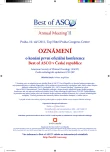-
Články
- Vzdělávání
- Časopisy
Top články
Nové číslo
- Témata
- Kongresy
- Videa
- Podcasty
Nové podcasty
Reklama- Kariéra
Doporučené pozice
Reklama- Praxe
Překonávají klinické studie fáze 0 stagnující vývoj protinádorových léčiv?
Autoři: L. Mendoza
Působiště autorů: INC Research, Prague, Czech Republic
Vyšlo v časopise: Klin Onkol 2011; 24(2): 143-145
Kategorie: Stručné sdělení
Souhrn
Recent guidance from the US Food and Drug Administration supports the conduct of a new type of exploratory clinical trials, commonly called phase 0 clinical trials, on the development of innovative anticancer agents, particularly targeted agents. Phase 0 clinical trials are controversial mainly because of the lack of clinical benefit to the participant patients. However, it was recognized that Phase 0 clinical trials can provide a platform to assessing the biological effects on the targets in tumoral human samples, evaluate biomarkers for drug effects and to generate essential human pharmacokinetics and pharmacodynamics data earlier in the drug development. It is expected that such trials will became a routine part of early-phase oncological drug development in the future.
Key words:
phase 0 clinical trials – targeted therapy – cancer
Zdroje
1. Twombly R. Slow start to phase 0 as researchers debate value. J Natl Cancer Inst 2006; 98(12): 804–806.
2. Guidance for industry, investigators, and reviewers. Exploratory IND studies. U.S. department of health and human services. Food and drug administration. Center for drug evaluation and research (CDER). January 2006.
3. Kola L, Landis J. Can the pharmaceutical industry reduce attrition rates? Nat Rev Drug Discov 2004; 3(8): 711–715.
4. Kinders R, Parchment RE, Ji J et al. Phase 0 clinical trials in cancer drug development: from FDA guidance to clinical practice. Mol Interv 2007; 7(6): 325–334.
5. European Medicines Agency, Committee for medicinal products for human use. Position paper on non-clinical safety studies to support clinical trials with a single microdose. London, June 23, 2004.
6. Bertino JS Jr, Greenberg HE, Reed MD. American colleague of clinical pharmacology position statement on the use of microdosing in the drug development process. J Clin Pharmacol 2007; 47(4): 418–422.
7. Kummar S, Kinders R, Rubinstein L et al. Compressing drug development timelines in oncology using phase “0” trials. Nat Rev Cancer 2007; 7(2): 131–139.
8. Johnson JI, Decker S, Zaharevitz D et al. Relationships between drug activity in NCI preclinical in vitro and in vivo models and early clinical trials. Br J Cancer 2001; 84(10): 1424–1431
9. Von Hoff DD, Turner J. Response rates, duration of response, and dose response effects in phase I studies of antineoplastics. Invest New Drugs 1991; 9(1): 115–122.
10. Abdoler E, Taylor H, Wendler D. The ethics of phase 0 oncology trials. Clin Cancer Res 2008; 14(12): 3692–3697.
11. Pocard M, Soria JC, Aldaz-Carroll L et al. Phase 0 clinical trials in oncology: an exploratory methodology for constructing a study with patients undergoing surgery for metastatic disease. J Clin Oncol 2010; 28(30): 4551–4553.
12. Kummar S, Kinders R, Gutierrez ME et al. Phase 0 clinical trial of the poly (ADP-ribose) polymerase inhibitor ABT-888 in patients with advanced malignancies. J Clin Oncol 2009; 27(16): 2705–2711.
Štítky
Dětská onkologie Chirurgie všeobecná Onkologie
Článek vyšel v časopiseKlinická onkologie
Nejčtenější tento týden
2011 Číslo 2- Metamizol jako analgetikum první volby: kdy, pro koho, jak a proč?
- Nejlepší kůže je zdravá kůže: 3 úrovně ochrany v moderní péči o stomii
- Nejasný stín na plicích – kazuistika
- Metamizol v léčbě různých bolestivých stavů – kazuistiky
-
Všechny články tohoto čísla
- Avastin v léčbě karcinomu prsu
- Prehľad potenciálnych onkomarkerov detekcie skorých fáz rakoviny vaječníkov
- Výsledky multimodální léčby glioblastoma multiforme: Konsekutivní série 86 pacientů diagnostikovaných v letech 2003–2009
- Léčba pacientů s relabovaným/refraktérním Hodgkinovým lymfomem
- Incidencia a mortalita na karcinóm prostaty vo vybraných krajinách strednej Európy
- Angiomyofibroblastóm krčku maternice: kazuistika
- Metastázujúci choriokarcinóm u 26-ročnej ženy – kazuistika
- Překonávají klinické studie fáze 0 stagnující vývoj protinádorových léčiv?
- Terapeutická ekvivalence a účinnost přípravku Binocrit® (HX575) u pacientů se symptomatickou anémií navozenou chemoterapií
- Comments on the TNM Classification of Malignant Tumours – 7th Edition
- Průběh a závěry mezioborového setkání „Winter GLIO TRACK Meeting“ 2011
- Zápis ze schůze výboru České onkologické společnosti dne 22. 2. 2011 v MOÚ BRNO
- Vzpomínka na MUDr. Olgu Přibylovou, Ph.D.
- Zpřesněme indikaci podávání inhibitorů kinázové aktivity EGFR
- Adjuvantní terapie u karcinomu rekta
- Klinická onkologie
- Archiv čísel
- Aktuální číslo
- Informace o časopisu
Nejčtenější v tomto čísle- Prehľad potenciálnych onkomarkerov detekcie skorých fáz rakoviny vaječníkov
- Metastázujúci choriokarcinóm u 26-ročnej ženy – kazuistika
- Adjuvantní terapie u karcinomu rekta
- Comments on the TNM Classification of Malignant Tumours – 7th Edition
Kurzy
Zvyšte si kvalifikaci online z pohodlí domova
Autoři: prof. MUDr. Vladimír Palička, CSc., Dr.h.c., doc. MUDr. Václav Vyskočil, Ph.D., MUDr. Petr Kasalický, CSc., MUDr. Jan Rosa, Ing. Pavel Havlík, Ing. Jan Adam, Hana Hejnová, DiS., Jana Křenková
Autoři: MUDr. Irena Krčmová, CSc.
Autoři: MDDr. Eleonóra Ivančová, PhD., MHA
Autoři: prof. MUDr. Eva Kubala Havrdová, DrSc.
Všechny kurzyPřihlášení#ADS_BOTTOM_SCRIPTS#Zapomenuté hesloZadejte e-mailovou adresu, se kterou jste vytvářel(a) účet, budou Vám na ni zaslány informace k nastavení nového hesla.
- Vzdělávání



